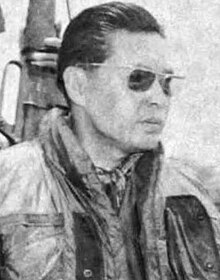Nguyễn Văn Lộc
Nguyễn Văn Lộc | |
|---|---|
 Lộc in 1968 | |
| 6th Prime Minister of the Republic of Vietnam | |
| In office 1 November 1967 – 17 May 1968 | |
| President | Nguyễn Văn Thiệu |
| Vice President | Nguyễn Cao Kỳ |
| Preceded by | Nguyễn Cao Kỳ |
| Succeeded by | Trần Văn Hương |
| Personal details | |
| Born | 24 August 1922 Long Châu Village, Châu Thành District, Vĩnh Long Province, Cochinchina, French Indochina (now Vĩnh Long, Vietnam) |
| Died | 31 May 1992 (aged 69) Paris, France |
| Political party | Independent |
| Spouse | Nguyễn Thị Mai |
| Children | 1 |
| Alma mater | University of Montpellier (LL.B.) University of Paris (MA) |
| Signature |  |
Nguyễn Văn Lộc (24 August 1922 – 31 May 1992) was a South Vietnamese educator, lawyer, and politician who served as Prime Minister of South Vietnam between 1 November 1967 and 17 May 1968.[1] His wife, Nguyễn Thị Mai, would be the subject of a biography, Black Silk Pajamas in 2000. Lộc attempted to leave Vietnam 14 times before successfully making it to Singapore in May 1983 as a refugee.[2] He died in Paris, France in May 1992 at the age of 69.[3]
Early life and education
Nguyễn Văn Lộc was born on 24 August 1922, in Long Chau village, Chau Thanh district - Vinh Long, (now Vinh Long City, Vinh Long Province) to a wealthy family. He obtained a bachelor's degree in law from the University of Montpellier, France in 1954 and a master's degree in criminal law from the University of Paris, France in 1964.
Political career
Since 1955, he has been a lawyer of the Saigon High Court.
Prime Minister of South Vietnam (1967-1968)
In November 1967, he was appointed by President Nguyễn Văn Thiệu to be the first Prime Minister of the Second Republic of Vietnam. In mid-November 1967, Mr. Nguyễn Văn Lộc presented his cabinet:
- Foreign Minister: Doctor Trần Văn Đỗ
- Defense Minister: Lieutenant General Nguyễn Văn Vy
- Interior Minister: Lieutenant General Linh Quang Viên
- Minister of Rural Construction: Lieutenant General Nguyễn Đức Thắng
- Economic Minister: Trương Thái Tôn
- Finance Minister: Lưu Văn Tính
- Minister of Culture and Education: Professor Tăng Kim Đồng
- Minister of Labor: Professor Phó Bá Long
- Minister of Health: Doctor Trần Lữ Y
- Minister of Public Works: Bửu Đôn
- Minister of Justice: Huỳnh Đức Bửu
- Minister for Ethnic Development: Paul Nur
- Minister of Agriculture and Land: Tôn Thất Trình
- Minister of Social Affairs and Refugees: Dr. Nguyễn Phúc Quế
- Transport Minister: Lương Thái Siêu
And two Ministers in charge of other areas. Deputy Ministers are Phạm Đăng Lâm (Diplomacy), Trần Lưu Cung (Education; in charge of Universities and Specializations), Professor Lê Trọng Vinh (Education; in charge of First, Secondary and High School), Law. Professor Hồ Thới Sang (Education; in charge of School Youth), Professor Bùi Xuân Bào (Culture), Nguyễn Chánh Lý (Commerce), Võ Văn Nhung (Technology). Professor Nguyễn Văn Tường and Đoàn Bá Cang hold the positions of Ministers of the Prime Minister's Office.
After the 1968 Tet Offensive, he was criticized and forced to resign. Since then, he has stopped doing politics and has turned to teaching.
Fall of Saigon
On April 30, 1975, when South Vietnam collapsed to the advancing forces of North Vietnam and the Viet Cong, Lộc like other high-ranking government and military officials of the Saigon government that stayed behind were sent to re-education camp operated by the new Communist Vietnamese government.[4] In an interview with the New York Times, Lộc describes in the re-education camps he and other inmates were forced to perform hard labor such as clearing the jungles, swamps, and minefields to building dams and farming. He mentions the conditions of the camps were so brutal that two or three people within the camps would die every week from malnutrition or illnesses [5] In 1980, after spending five brutal years in the re-education camp, the Communist government decided to let Lộc return to Saigon (now Ho Chi Minh City). Lộc explains,
I nearly died in the labor camp, where I was kept with about 1,500 others on a near starvation diet, they let me return to Saigon in 1980 only after they felt that I was dying.[6]
References





